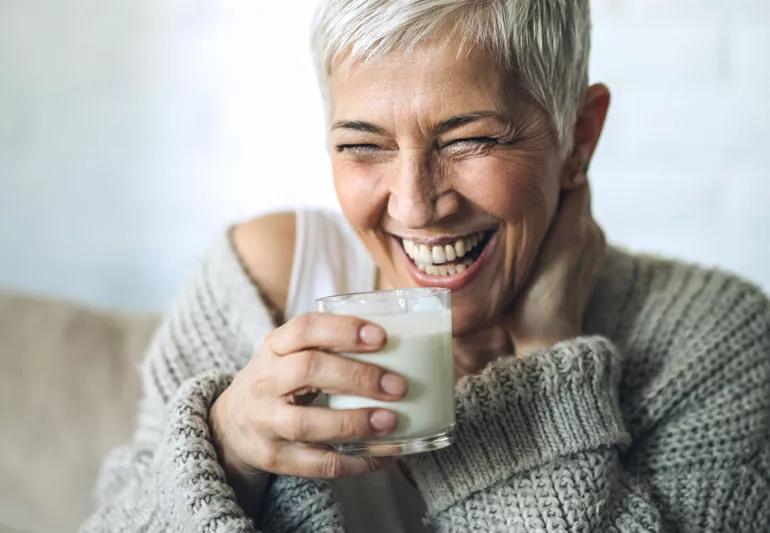High milk consumption linked to higher mortality, hip fractures

Image content: This image is available to view online.
View image online (https://assets.clevelandclinic.org/transform/58020b8d-bf52-4ee2-af21-9b5b34334d6a/adultMilkConsume-929486568-770x533-1_jpg)
adult drinking milk
If you drink milk to keep your bones strong, there’s good logic in it. Milk and dairy products are concentrated calcium sources, and we know calcium fortifies bones and prevents osteoporosis.
Advertisement
Cleveland Clinic is a non-profit academic medical center. Advertising on our site helps support our mission. We do not endorse non-Cleveland Clinic products or services. Policy
However, can drinking too much milk make your bones more brittle? Researcher and dietitian Gail Cresci, PhD, RD, walks through whether or not it’s safe to drink a lot of milk.
A Swedish study suggests that while milk may be good, more is not better.
This study found that too much milk – three or more glasses a day – was not only associated with mortality but also an increased risk of fracture and hip fracture.
Plus, it found that women who reported drinking three or more glasses of milk each day nearly doubled their risk of death in relation to women who drank less than one glass each day. Men were not as affected as women, but those who drank three or more glasses of milk each day still showed a significant increase in mortality.
A separate study reported that higher milk and dairy product consumption does not necessarily lower the risk of osteoporosis and hip fracture as noted in cohort studies versus looking at case-control and cross-sectional studies.
Does this mean you shouldn’t drink milk? Don’t go shunning the jug just yet.
One study found that milk contributes to meet nutritional recommendations and may help protect against chronic diseases. Although it’s true that milk and dairy are among the most calcium-rich foods you can eat, there are other substances in milk that may warrant some moderation.
Advertisement
“While the Swedish study raises interesting questions, there is not strong enough evidence to warrant a restriction on milk,” says Dr. Cresci.
Vitamin D and a diet filled with calcium is key to strong bones.
“Calcium is linked with bone health, but vitamin D promotes calcium absorption and maintains adequate blood levels of calcium and phosphate to allow for normal bone mineralization,” says Dr. Cresci.
Without enough vitamin D, bones can become thin and brittle and the formation of strong new bone can be prevented. Vitamin D protects older adults against osteoporosis. Your doctor may suggest you get a blood test done to figure out your vitamin D level. However, no such test exists for calcium levels.
While milk contains 300 mg of calcium per cup, there are many other good dietary sources to keep in mind. Make sure you’re eating an adequate amount of calcium by including cheese, yogurt, greens (collards, kale), soybeans, figs, broccoli, oranges, sardines and salmon (with bones) and many fortified foods into your food rotation.
“If you want to drink milk for strong bones, I recommend no more than one glass a day,” says Dr. Cresci. “Do this in addition to a mixed diet rich in calcium. If you are unable to consume adequate amounts in your diet, consider supplementation with about 1200 mg of calcium and 600 to 800 IU of vitamin D daily, especially in winter months.”
Milk and dairy consumption is associated with reduced risk of some chronic diseases and had a beneficial effect on bone mineral density, but not risk of bone fracture. Milk consumption has some evidence to support against chronic diseases (type 2 diabetes), cardiovascular disease (stroke) and some cancers (colorectal, bladder, gastric, breast).
Consult with your doctor or dietitian before taking any new supplements.
Advertisement

Delivered every Tuesday!
Sign up for our Health Essentials emails for expert guidance on nutrition, fitness, sleep, skin care and more
It's a letter about the news!

Every two weeks once
Sign up for our Health Essentials emails for expert guidance on nutrition, fitness, sleep, skin care and more.
Learn more about our editorial process.
Advertisement
You want to get enough but avoid hypercalcemia — and protect your heart
From fatigue to seizures, the symptoms of hypocalcemia can impact more than your bones
Moderation is key: A good source of calcium and protein, but it’s also high in calories and sodium
How to help your child build healthy bones
There are several vitamins and mineral supplements that many people can benefit from — but it’s important to consult with a healthcare provider before you start one
A daily dose of vitamin D can help babies build strong bones, as well as boost their brain development
Research shows that high doses of vitamin D do nothing to lower your cardiovascular risk
If you’ve been diagnosed with breast cancer, having a normal range of vitamin D can help
Type 2 diabetes isn’t inevitable with these dietary changes
Applying a hot or cold compress can help with pain
Pump up your iron intake with foods like tuna, tofu and turkey